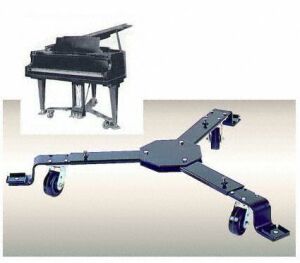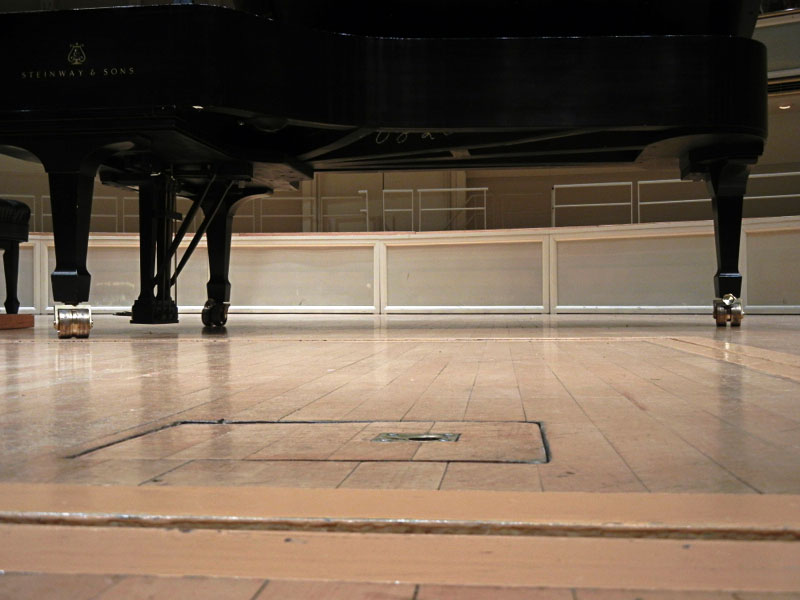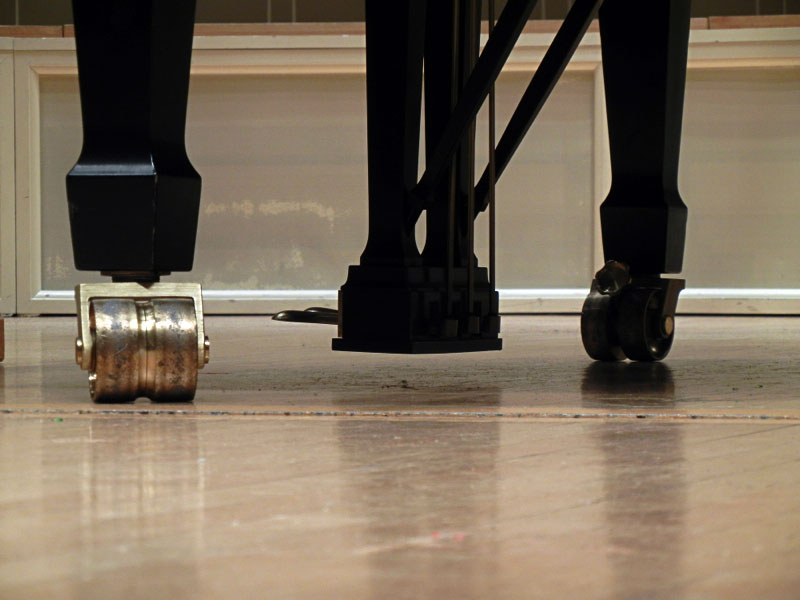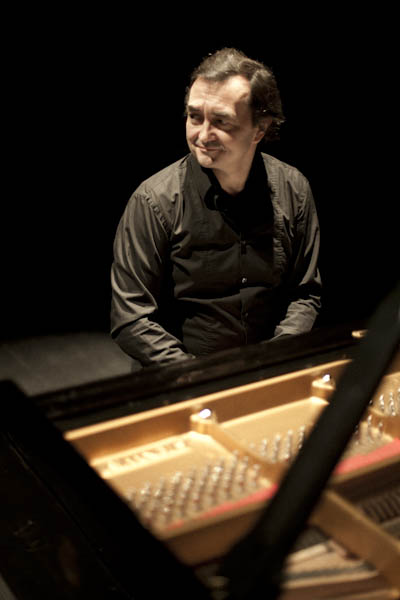Floating pianos
Posted by: Haim Ronen on 03 April 2013
In all recent live performances of classical music I attended the piano was always riding a wheeled carriage without having its legs anchored to the stage. I wonder why the instrument was never lowered before playing it and how the sound was altered by the added height and the rubber coupling of the carriage wheels.
Haim, do you mean this kind of transport?

As far as I know, to go on these movers, the original brass casters are removed and the three legs are secured. Once on one of these you don't raise or lower the piano anymore. They are made so that the keyboard height matches the same height as with the original brass casters.
The reason most halls use these are that the usual smaller brass caster are not the best for rolling a 450kg Model D Steinway. The rubber casters are also very much quieter.
It is a good question as to how this setup could affect the pianos sound quality overall? I would guess that the room itself has more effect on this but more importantly is the quality of the soundboard?
Regards,
Doug
Doug is correct, no additional height. And no change to overall sound to speak of.
I see an opportunity for an audiophile RollerShelf under the Steinway. After hearing the degree of improvement they allowed under my 100kg (each) speakers, why not under a real instrument. ISTR that a certain guitarist from the Pink Floyd used Mana under his guitar amp many years ago.
Haim, do you mean this kind of transport?

As far as I know, to go on these movers, the original brass casters are removed and the three legs are secured. Once on one of these you don't raise or lower the piano anymore. They are made so that the keyboard height matches the same height as with the original brass casters.
The reason most halls use these are that the usual smaller brass caster are not the best for rolling a 450kg Model D Steinway. The rubber casters are also very much quieter.
It is a good question as to how this setup could affect the pianos sound quality overall? I would guess that the room itself has more effect on this but more importantly is the quality of the soundboard?
Regards,
Doug
Yes. I still don't understand how you maintain the same hight of the keyboards while the brass casters are resting on a surface which is higher than the floor.
I discussed the matter with Todd Garfinkle of MA who on top of being a pianist is one of the best digital recording engineer in the US and that's what he says:
"The only answer I can think of is that they did not care about lowering the piano onto the stage, as in "they were lazy." Obviously, it is possible to situation the piano directly onto the stage floor. The carriage apparatus is used to facilitate the moving of the piano from one place to another without damaging the small wheels on the piano legs or the stage floor. There is a large wheel on the cart that allows the user to lower the piano onto a solid surface, such as the stage...."
"The sound of the piano is affected by the quality of the floor on which it is positioned. However, if the quality of the floor is not very good, perhaps a "floating" piano is better. One would have to experiment, I suppose. Most pianists have no idea about this, I believe.....
The difference may be more audible from a distance and not where the pianist is sitting. That is hard to say."
Not sure what Todd intended, but speaking as a pianist, I think I have a pretty good idea about this. Unless I'm misunderstanding what he's saying, the brass casters aren't resting on anything ... there aren't any casters. As Florestan wrote, "the original brass casters are removed." The platforms where the caster-less legs fit are the same height as the casters, therefore height of piano is the same.
As long as the wheels can be locked it's not really a problem, and if a piano gets moved a lot, which many do, it's much easier. Essential, even, if staff on hand is unable to pick up a full concert grand.
Fred,
I think that what Todd is saying is that as a recording engineer standing away from the piano he can distinguish differences in sound depending on how the piano is coupled to the floor (original brass wheels or carriage rubber wheels) which the average pianist would not be aware of.
In all recent live performances of classical music I attended the piano was always riding a wheeled carriage without having its legs anchored to the stage. I wonder why the instrument was never lowered before playing it and how the sound was altered by the added height and the rubber coupling of the carriage wheels.
In our Dutch concert halls I've been to (Concertgebouw Amsterdam and de Doelen Rotterdam and outdoor live performances), they keep them on the original brass wheels directly on the wooden stage, and never on carriages or insulators of any type.
I can imagine it vibrates differently when isolated from the floor.
Aleg,
Good to hear that in Holland the pianos are resting respectfully on their own legs.
Even if there is no difference in sound I expect a large concert hall like the Chicago Symphony to let their piano be played on its own, the way it was designed, leaving all the extra apparatus of cranes out of our sight.
I can imagine it vibrates differently when isolated from the floor.
Sure, there will be differences. It is such a complicated outcome though that it is hard to quantify all aspects and changes together. Not very different from this hi-fi hobby that most of us share here. You massage a cable or tighten the connector ring less or more or even cut it off or put a CD case on a box and there must be a resulting change of outcome? Some hear it, others don't. However, I think there are macro and micro changes. The sum of 25 micro changes adds up to some result but when changing 1 of the 25 things it is hard to say whether this can change the result enough or cause any detriment? Changing one fundamental component on the other hand can make or break the outcome.
Just as many know with Naim equipment it mostly boils down to the quality of the equipment and the room set-up (size and other factors). Just to be facetious here a little would anyone believe the sound of a violinist changes if the player is wearing high-heels or Adidas runners? No, it matters more about the soundboard and the room setup.
While decoupling a grand piano will make a given difference that many could hear I don't think it would be a fundamental concern in comparison to the main factors of instrument and room conditions. Having no audience vs. 100 people vs. 1000 people etc. would cause more change in the outcome, for instance. But could anyone hear the difference in outcome of 99 people versus 100 in the room? Well, you might if that one person is the annoying one who breaths heavy, wheezes, doesn't shower, coughs a lot, constantly looks around etc....
There are so many factors that make a great instrument but focusing just on the soundboard, I believe this is one of the most important factors that make or break an instrument and determines much about the quality of the sound (ignoring hammers, strings, bows, lacquers etc for now).
It is the soundboard that moves the air in the room. It takes the mechanical sound energy of an excited string and transduces it effectively throughout the room It starts with the quality of the wood. This is the reason why every grand piano or every stringed instrument looks a similar shape yet can sound so different. If two pianos made by the same company, one after each other, have identical parts, they will still likely sound different. Both have a Sitka spruce soundboard but the quality of that spruce will likey be different. The density and age etc all change the outcome. Did the particular tree grow fast or slow or where geographically did it come from with different weather conditions and stress etc.
Next in importance is how does the sound reflect about in the room. I am no expert in acoustic room treatment to improve sound but I am very interested in this and would love to learn more about this. From an intuitive level only though I understand that some technical knowhow would improve my home listening experience. From a practical point of view though and limited resources I also know I'm stuck. I had to put a stereo within an existing house and have to live with what it is to a large extent. The same goes for my piano. Again the house wasn't built around the piano and the room is not an ideally designed room in size and function but I have to live with what it is until some time after I win a lottery.
Over the last week I finally did a complete rebuild, cleanup and repositioned my Naim system/speakers. Because my room is relatively small I had to put 6 or 8 black boxes underneath the grand piano to keep them out of the way. So for a couple of days while this was in process I also happened to have practiced the piano with this arrangement in place. I may be half crazy but I swear that this improved the sound or at least the perception I had of the how the sound reflected in my room. I liked what I was hearing but it didn't want to believe it until I compared to the sound after these boxes were removed. Sure enough, the sound was better with the boxes underneath for some reason.
The point is that what's on the floor under a piano and how the sound reflects around the room changes everything. While changing between the brass casters and the piano dolly setup I do not doubt that it will change the outcome somewhat, I would guess that the piano quality and the room factors itself have far more fundamental impact on the outcome though.
I agree ... piano quality and room conditions are the fundamental factors. Casters, not so much.
I suppose a recording engineer with really good ears (or even a pianist!) might be able to detect some very slight difference in sound between brass casters and the rubber wheels of a dolly, but I highly doubt that in a blindfold test anyone would know which is which.
This was how Aimard's piano was coupled to the floor for his Debussy Preludes recital today at The Orchestra Hall.
No floating piano.

This was how Aimard's piano was coupled to the floor for his Debussy Preludes recital today at The Orchestra Hall.
No floating piano.

Hello Kuma,
How was it ?
Regards,
Mark
Mark,
 I had a sneaking suspicion that he would be much comfortable playing Debussy than Beethoven Concertos and I was right!
I had a sneaking suspicion that he would be much comfortable playing Debussy than Beethoven Concertos and I was right!
The Book I was shrouded in warm spring air which is fitting for the first set. He did not have the vividness of Richter or intimacy of Gieseking but he had just the right attitude and pastel hued atmosphere for the rest of tunes. Book II was more dramatic as if saturation and contrast were dialed up a bit. Witty and spontaneous throughout It's a nice contrast from the first set and he was having a great time.
I enjoyed the performance. He's a good piano player. Very refreshing from many of *robot* by the book ( no pun intended ) young pianists.
Plus audience was quiet~ noone coughed at the golden silence. ( I guess we are just getting over a flu season )
Now Haim should check out how Hamlin's piano is going to be set on the floor next month. ![]()
Mark,
 I had a sneaking suspicion that he would be much comfortable playing Debussy than Beethoven Concertos and I was right!
I had a sneaking suspicion that he would be much comfortable playing Debussy than Beethoven Concertos and I was right!
The Book I was shrouded in warm spring air which is fitting for the first set. He did not have the vividness of Richter or intimacy of Gieseking but he had just the right attitude and pastel hued atmosphere for the rest of tunes. Book II was more dramatic as if saturation and contrast were dialed up a bit. Witty and spontaneous throughout It's a nice contrast from the first set and he was having a great time.
I enjoyed the performance. He's a good piano player. Very refreshing from many of *robot* by the book ( no pun intended ) young pianists.
Plus audience was quiet~ noone coughed at the golden silence. ( I guess we are just getting over a flu season )
Now Haim should check out how Hamlin's piano is going to be set on the floor next month. ![]()
Kuma,
Thanks for that. It's also interesting to compare what you say with what is written in the following review of these recordings with DGG. They seem to be a bit in opposition. Link provided as follows:-
http://www.guardian.co.uk/musi...eludes-aimard-review
It also mentions the ECM record (![]() ) that I like a lot from Alexei Lubimov.
) that I like a lot from Alexei Lubimov.
In any case, I look forward to this towards the end of the year.
It's great when you get that sort of feeling/connection at a piano recital, where you are completely absorbed by the performance/music. As I said in an earlier post, I usually get this connection when I go and see Sokolov play and the one time that I saw Radu Lupu. The time when I went to see Piotr Anderszewski completely left me cold, but then to be fair he did replace a sick Murray Perahia at quite short notice and one particular chap in the audience had a nervous cough....
Regards,
Mark
Mark,
I haven't listened to his Preludes CD but I've noticed that live performance can be very different experience from the studio recording.
I would never describe Aimard's performance technically excellent because there were a few missed notes. Comparatively, Richter's Preludes far exceeds Aimards in terms of precision and vividness. Altho his Debussy is a bit stiff. Aimard's were much more *with it* and relaxed and casual.
However, I enjoyed the performance I can't say that I have connected with him like I do with Gieseking or Richter even tho latter two are mere recording (rather poor ones even! ).
I haven't heard Zimerman's Preludes but I found Michelanglli's a bit pondering. ( I love his Images, tho )
Sokolov live would be rather interesting as I haven't connected with him from his CDs.
I haven't seen him come around in the US.
Anyways, curious to hear your Aimard impression when you go see him.
Where is he playing btw?
Kuma,
I'm surprised that you don't get on with the Sokolov discs. I particularly enjoy the Beethoven Diabelli Variations disc. The Bach Art of Fugue is also very good. There is a nice DVD on Naive which I like.
He did play in the US last year in Louisiana.
The tour Dates are usually given under
http://www.amcmusic.com/concer...-sokolov-concerti-2/
Aimard will be playing at the Alte Oper in Frankfurt at the start of the flu season ![]()
Regards,
Mark
Mark,
Perhaps I might have started off Sokolov with a wrong foot. He was seriously outdone by others in Chopin and Schubert pieces.
He was originally recommended as a modern day Richter. Whilst his playing is reminiscent of young Ricther with lots of drama, overall his style feels stiff and lacking lyricism and spontaneity as if everything was premeditated. Mechanism of piano playing showing where as I don't *see it* from later Ricther or Kempff.
So I haven't bothered with the rest of Box set but I will try his Beethoven and Bach.
Aimard will be playing at the Alte Oper in Frankfurt at the start of the flu season
Be sure to report back how his piano was going to be coupled on the floor at the Alte Oper. ![]()
Be sure to report back how his piano was going to be coupled on the floor at the Alte Oper. ![]()
I have the feeling that it will not be on a floating stand but sitting on the original supplied casters directly on the floor as it always is for all the piano recitals. I could be wrong though![]()
At Nancy I did see some strange efforts/methods to get the piano level though
Sorry to have diverged the original thread...
Regards,
Mark
This was how Aimard's piano was coupled to the floor for his Debussy Preludes recital today at The Orchestra Hall.
No floating piano.

kuma,
Thanks for posting Aimard's brass wheels. At least some piano concerts are being performed properly at the Chicago Symphony. Hopefully Marc-Andre Hamlin will show the same respect to the instrument.
Haim,
I will report back with Pollini's piano. ![]()
Haim,
I will report back with Pollini's piano. ![]()
Kuma,
Like always, you are way ahead of me.
I am curious to see if he's travelling with his own piano.
Now you raised my curiosity with a floating piano device I"ll be looking out for it.
Where did you see one?
Kuma, latest one was at Lake Forest College:
Sunday afternoon concert:

Chicago Chamber Musicians playing Beethoven's String Quartet No. 6 and Piano Trio Op. 70, No. 1 as well as Debussy's Sonata for Violin & Piano in G minor and his String Quartet in G minor Op. 10. Parts I liked most were the Beethoven piano trio (especially the middle 'ghosty' movement) and Debussy's sonata for violin & piano.
Performed at the Lily Reid Holt Memorial Chapel which is a small hall with great acoustics (Naim had few of their discs recorded there). After the concert there was a small reception with the performing musicians.
On top of the delicious music weather was accommodating too. It started snowing only after we arrived back home.
Thanks for posting Aimard's brass wheels. At least some piano concerts are being performed properly at the Chicago Symphony. Hopefully Marc-Andre Hamlin will show the same respect to the instrument.
Haim, I'm curious as to why you think using a dolly is improper and indicates disrespect?
Kuma, latest one was at Lake Forest College ... Performed at the Lily Reid Holt Memorial Chapel which is a small hall with great acoustics (Naim had few of their discs recorded there). After the concert there was a small reception with the performing musicians.
Yes, a beautiful little hall, but unfortunately the piano has not been well-maintained and needs serious renovation. I played a concert there about a month ago and despite having just been tuned, it went out during the sound check ... the tuner tuned again but it went out again shortly after the concert began. It's a shame because it used to be quite a nice instrument.
